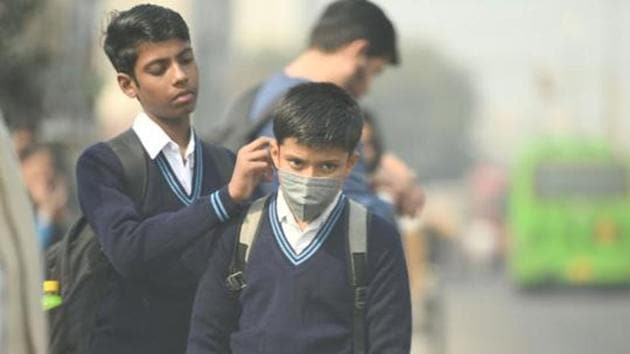Post Covid-19, India needs increased focus on air quality
The coronavirus crisis necessitates making health and social protection a priority. But we must not lose momentum on the strides made in tackling air pollution
The nationwide lockdown due to the coronavirus disease (Covid-19) is certain to bring enormous social and economic costs to the country. The lockdown has, however, afforded us a look into how our skies and trees could look if Indian cities had cleaner air. It highlights the fact that even though the government must prioritise the economy in the coming months, the other public health crisis – air pollution – can’t be overlooked. This brings into focus the Centre’s Rs 4,400-crore grant to municipal corporations (MCs) of bigger cities for 2020-21 to tackle air pollution.

Covid-19 has re-emphasised the need to proactively invest in public health systems. This includes mitigating risk factors that increase the incidence of illnesses. Air pollution is the second largest risk factor – behind malnutrition – contributing to India’s disease burden. Commonly known impacts of air pollution include cardio-respiratory diseases, lung cancer in adults, and acute lower respiratory infections in children. Besides, emerging research suggests that it impacts early childhood development, including birth weight and growth. Early evidence also suggests that air pollution increases the risk of Covid-19 infection.
In what now seems a lifetime ago, last winter witnessed one of the most severe smog episodes around Delhi in recent memory, accompanied by unprecedented attention on air quality, with the issues being raised in Parliament, discussed in the media, and included in the Delhi assembly election manifesto. The Union finance minister accepted the interim recommendations of the 15th Finance Commission (FC) that provides additional fiscal support in 2020-21, incentivising MCs to tackle air pollution in cities with one million or more population.
To put the quantum of outlay in perspective, in 2019-20, the National Clean Air Programme (NCAP) budget under the ministry of environment, forests and climate change (MoEFCC) was merely Rs 300 crore, distributed among 102 polluted cities, with grants ranging between Rs 10 crore and Rs 10 lakhs. The outlay also dwarfs MoEFCC’s total budget of Rs 3,100 crore for 2020-21, signalling a shift in the air quality management approach, with additional resources and increased devolution towards MCs.
While the MoEFCC is still developing the performance framework to determine exactly how the grant will be distributed across cities, the 15th FC report outlines the broad contours. It has recommended that the grants be allocated to cities based on their population. Thus, the total possible grant size for Mumbai would be Rs 488 crore, and for a smaller city, such as Tiruchirappalli, it would be Rs 21 crore. This grant is to be released in two instalments: Half of it upfront for “air quality improvement measures including capacity building of local bodies”, and the rest is subject to the city’s performance against its targets.
This is the first time that an FC has given grants specifically to tackle air pollution. Air pollution has multiple sources in Indian cities, and many of these – such as waste burning, and road and construction dust – fall directly under the ambit of MCs. Tackling air pollution involves not only regulating emissions from vehicles and industries but also improving urban governance and public services.
Institutionally, too, the approach marks a recognition of urbanisation’s changing needs by earmarking a larger share of grants to urban local bodies (ULBs): From 30% in the previous year to 37.5% in 2020-21, and making a distinction between million-plus urban agglomerates and smaller towns.
Finally, by setting aside funds upfront for capacity-building, the FC acknowledges that if MCs are expected to deal with air quality-related issues, their human and fiscal resources must be strengthened. A review of 23 cities by Janagraaha in 2017 had found that most cities lack urban planners, and more than half of the cities did not generate enough revenue to meet even their salary costs.
To be sure, while these grants are necessary, they are not enough to improve air quality. Much depends on the final design of the performance framework. City-level measures by the MCs need to be complemented with actions on sources of air pollution outside their jurisdiction – be it within or outside the city, in the larger regional “airshed”. To do this, the grants framework should be integrated with NCAP action plans and institutions, with aggressive but achievable timelines for implementing prioritised measures, and a comprehensive cross-agency strategy for resource allocation. Further, it needs a sustained effort to improve the air quality, necessitating, at a minimum, the continuation of the grants for the next five years.
The emergence of different city models of Covid-19 response – from Bhilwara to Agra – shows why having a decentralised form of governance, capable of responding to city-specific needs, matters. While the budget priority in the immediate term is rightly given to health and social protection, we must not lose momentum on the strides made in tackling air pollution. Proactively channelling resources to mitigate a critical risk factor today is a crucial investment for tomorrow’s public health.
Avani Kapur is director of the Accountability Initiative, and fellow at the Centre for Policy Research (CPR). Santosh Harish is a fellow at CPR
The views expressed are personal



